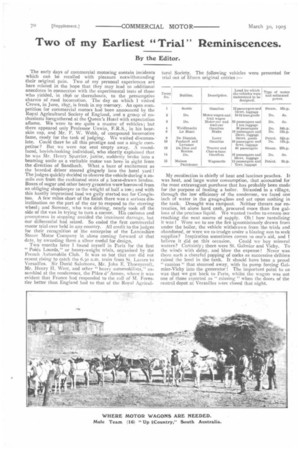Two of my Earliest " Trial " Reminiscences.
Page 22

If you've noticed an error in this article please click here to report it so we can fix it.
By the Editor.
The early days of commercial motoring contain incidents which can be recalled with pleasure notwithstanding their original pain. Two of my personal experiences are here related in the hope that they may lead to additional anecdotes in connection with the experimental tests of those who yielded, in 1896 or thereabouts, to the presumptive charms of road locomotion, The day on which I visited Crewe, in June, 1897, is fresh in my memory. An open competition for commercial motors had been announced by the Royal Agricultural Society of England, and a group of enthusiasts foregathered at the Queen's Hotel with expectation aflame. We were to see quite a muster of vehicles; but there appeared only Professor Unwin, F.R.S., in his bearskin cap, and Mr. F. W. Webb, of compound locomotive fame, ready for the task of judging. We waited disconsolate. Could there be all this prestige and not a single competitor? But we were not sent empty away. A roundfaced, boyish-looking individual, who shortly explained that he was Mr. Henry Spurrier, junior, suddenly broke into a beaming smile as a veritable motor van hove in sight from the direction of Sandbach. What a buzz of excitement as the bearded driver steered gingerly into the hotel yard ! The judges quickly decided to observe the vehicle during a 20mile run from the cushioned seats of a horse-drawn landau. Boxes of sugar and other heavy groceries were borrowed from an obliging shopkeeper to the weight of half a ton ; and with this hastily improvised load we gaily started out for Congleton. A few miles short of the finish there was a serious disinclination on the part of the car to respond to the steering wheel; and Sumner, who was driving, nearly took off the side of the van in trying to turn a corner. His coolness and promptness in stopping avoided the imminent damage, but our differential had seized. So ended the first commercial motor trial ever held in any country. All credit to the judges for their recognition of the enterprise of the Lancashire Steam Motor Company in alone coming forward at that date, by awarding them a silver medal for design.
Two months later I found myself in Paris for the first " Poids Lourds," or heavy-weight trials, organised by the French Automobile Club. It was so hot that one did not resent rising to catch the 6.30 a.m, train from St. Lazare to Versailles. Sir David Salomons, Mr. John E. Thornycroft, Mr. Henry H, West, and other " heavy automobilists," assembled at the rendezvous, the Pike d' Armes, where it was evident that France had responded to the call of M. Forestier better than England had to that of the Royal Agricul
tural Society. The following vehicles were presented for trial out of fifteen original entries :— My recollection is chiefly of heat and luscious peaches. It was heat, and large water consumption, that accounted for the roost extravagant purchase that has probably been made for the purpose of feeding a boiler. Stranded in a village, through the low efficiency of the condenser, we faced one inch of water in the gauge-glass and sat upon nothing in the tank. Drought was rampant. Neither threats nor entreaties, let alone hard cash, procured more than five gallons of the precious liquid. We wanted twelve to ensure our reaching the next source of supply. Oh! how tantalising it was ! Were we to see the fire ignominiously drawn from under the boiler, the vehicle withdrawn from the trials and abandoned, or were we to trudge under a blazing sun to seek supplies? Inspiration sometimes comes to one's aid, and
believe it did on this occasion. Could we buy mineral waters? Certainly; there were St. Galmier and Vichy. To the winds with delay, and blow the expense ! Never was there such a cheerful popping of corks as successive driblets raised the level in the tank, It should have been a proud " camion " that steamed away, with its pump forcing Galmien-Vichy into the generator The important point to us was that we got back to Paris, whilst the wagon was not one of those reported as " missing " when the doors of the central depot at Versailles were closed that night.
























